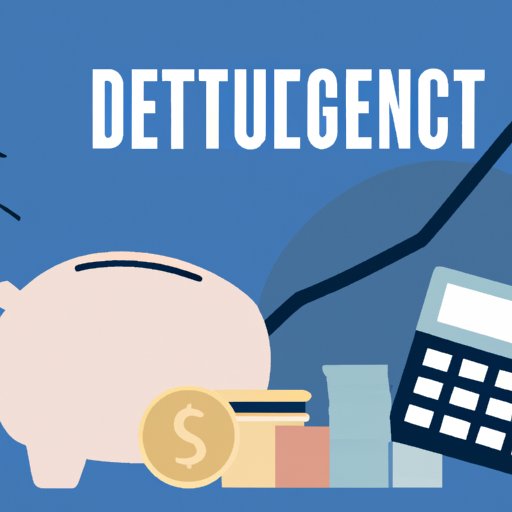Introduction
Managing your finances can be overwhelming, especially if you’re not sure where to start. Whether you’re trying to save for retirement, pay off debt, or simply make ends meet, it’s important to have an understanding of how to organize and manage your money. This article will provide an overview of how to figure out your finances and offer advice on budgeting, debt repayment, tax deductions, savings and investments, researching financial products and services, and setting long-term financial goals.

Create a Budget and Track Expenses
Creating a budget is the first step in getting your finances in order. A budget allows you to track your income and expenses so that you can see where your money is going and identify areas where you can save. The benefits of creating a budget include being able to identify areas where you can cut back on spending, tracking progress towards financial goals, and having a better understanding of your overall financial situation.
When creating a budget, it’s important to list all of your income sources as well as all of your expenses. It’s also helpful to separate expenses into categories such as housing, transportation, food, entertainment, and debt. Once you have a list of your income and expenses, you can begin to create a budget that works for you. To stay on track with your budget, it’s important to track your expenses regularly. You can use apps or online tools to help make tracking easier.
Prioritize Debt Repayment
If you have debt, it’s important to prioritize repayment. Some types of debt, such as student loans or credit cards, should be paid down as quickly as possible. Other types of debt, such as mortgages, may be easier to manage over a longer period of time. There are several options for paying down debt, including making extra payments, refinancing, and consolidating multiple debts into one loan. It’s also important to create a plan for paying down debt and stick to it.
When paying down debt, it’s also important to consider strategies that can help you save money. For example, you may be able to negotiate lower interest rates with your creditors or take advantage of balance transfer offers. Additionally, you may be able to take advantage of government programs designed to help those with student loan debt.

Take Advantage of Available Tax Deductions
Tax deductions can help reduce the amount of taxes you owe each year. It’s important to research and identify all of the deductions that you may be eligible for. Common deductions include charitable contributions, medical expenses, and home office expenses. Additionally, some states offer tax credits for certain activities, such as saving for retirement or donating to charity.
When claiming deductions, it’s important to keep accurate records and document all expenses. Additionally, it’s important to maximize deductions by taking advantage of all available credits and deductions. Finally, it’s important to file taxes on time to avoid penalties and interest.
Automate Savings and Investments
One of the best ways to ensure that you are saving and investing for the future is to automate these processes. Automating savings and investments can help you stay on track with your financial goals and ensure that you are regularly contributing to your savings and investments. When setting up automated payments, it’s important to consider factors such as frequency, amount, and investment type.
There are many benefits to automating savings and investments, including reducing the risk of forgetting to make payments and ensuring that you are consistently meeting your financial goals. Additionally, automating savings and investments can help reduce stress and free up time that would otherwise be spent managing finances. When choosing investments, it’s important to research different options and choose ones that align with your financial goals.
Research Financial Products and Services
When researching financial products and services, it’s important to compare different options and choose the ones that best fit your needs. It’s also important to consider factors such as fees and terms when comparing products and services. Additionally, it’s important to shop around for the best deal and read customer reviews before making any decisions.
When researching financial products and services, it’s also important to understand the risks associated with each product or service. Additionally, it’s important to consider the impact that the product or service could have on your taxes and overall financial situation. Finally, it’s important to understand the terms and conditions of any products or services that you choose to use.
Develop a Plan for Long-Term Financial Goals
Setting long-term financial goals is an important part of financial planning. It’s important to set both short-term and long-term goals and create a plan for achieving them. Some common long-term goals include saving for retirement, buying a home, starting a business, or paying off debt. When setting long-term goals, it’s important to consider factors such as timeline, cost, and impact on your overall financial situation.
Once you have established your long-term goals, it’s important to develop a plan for achieving them. This plan should include steps such as setting up automatic payments, researching investment options, and creating a budget. Additionally, it’s important to stay motivated and track your progress towards your goals. Finally, it’s important to review your goals and plan regularly to ensure that you are staying on track.
Conclusion
Figuring out your finances can seem daunting, but it doesn’t have to be. By creating a budget and tracking expenses, prioritizing debt repayment, taking advantage of available tax deductions, automating savings and investments, researching financial products and services, and developing a plan for long-term financial goals, you can get your finances in order and achieve your financial goals. With a bit of effort and dedication, you can become a master of your finances.
(Note: Is this article not meeting your expectations? Do you have knowledge or insights to share? Unlock new opportunities and expand your reach by joining our authors team. Click Registration to join us and share your expertise with our readers.)
